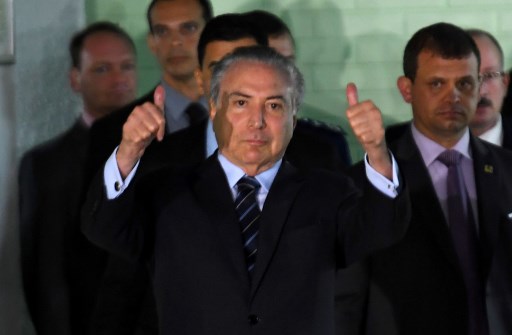
BRASÍLIA, Brazil (AFP) – Brazil’s Congress rejected corruption charges against President Michel Temer on Wednesday, meaning he will not have to face trial and is free to pursue austerity reforms in Latin America’s biggest economy.
The vote in the lower house threw out the charges just an hour after Temer, 77, was discharged from hospital where he was admitted earlier with a blocked urinary tract.
Temer’s allies had been widely expected to bar a demand by prosecutors for the president to face trial in the Supreme Court, but a note of drama was injected by the surprise news that he had been taken to hospital.
The president was admitted to the Army Hospital in the capital Brasilia complaining of discomfort, and was examined with a urinary catheter.
On release, he was told to go home to rest, the presidency said.
The first president in the country to face criminal charges while in office, Temer is accused of obstruction of justice and racketeering. He denies any wrongdoing.
The lower house of Congress would have had to vote by a two-thirds majority to force Temer to stand down for 180 days and the Supreme Court to open a trial. However allies rapidly racked up more than a third of the votes, blocking the process.
A canny veteran of Brasilia’s notoriously corrupt political scene, Temer struck a confident tone ahead of the showdown, painting himself as needed at the helm of the country’s cautious recovery from a deep recession.
In August, allies in Congress threw out an earlier bribery charge by a heavy margin.
Temer’s sweeteners
Ironically, what made it easier for Temer was that scores of those judging him in the lower house are themselves targets of anti-corruption probes.
Many deputies want to slow down Brazil’s energetic anti-corruption prosecutors who have unleashed the historic “Car Wash” probe against the country’s elite over the last three years.
Critics say the president boosted his chances of survival through blatant vote buying, opening up the budgetary purse to give Congress members the projects back in their home states that will help their own causes.
Among the sweeteners handed out by Temer were removing Sao Paulo’s Congonhas airport from a list of big privatizations and lowering environmental protection fines — a gesture to the powerful agricultural industry lobby.
Temer had “more than sufficient votes to turn the page, even with an erosion of his political capital,” a government source who asked not to be identified told AFP.
Opposition deputies acknowledged they did not have the numbers to bring down Temer, despite his huge unpopularity with Brazilians. They were reduced to trying to string out the debate by preventing a quorum and slowing down the vote.
As for Temer, he has promised to come out of the vote ready to “put Brazil on the rails” after a two-year recession that has seen many investors flee.
Market watchers say the most significant result of Wednesday’s vote will be indications of how many deputies support the president’s bid to cut the generous pension system.
Temer says the reforms are needed to tame a runaway budget, but the proposals are hugely unpopular with Brazilians and Congress has been cagey about whether to support the policies ahead of general elections in 2018.
After taking over the presidency in controversial circumstances following leftist president Dilma Rousseff’s impeachment last year, Temer has never had any illusions about his public standing, and he is not going to run for re-election.
He has record low ratings, with only three percent considering his government “good” or “very good,” according to the latest opinion poll in September.
© Agence France-Presse







